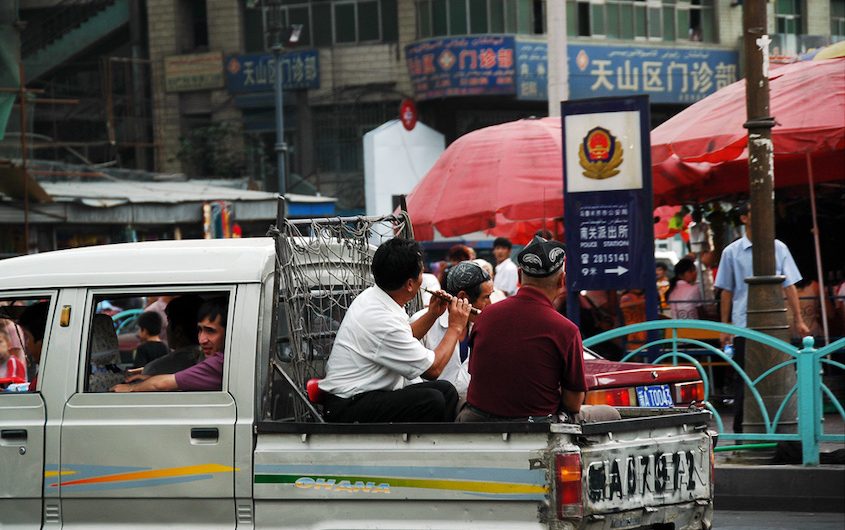
neverdance via Wikimedia Commons
EU Answers U.S. Call to Cooperate on China, Now Comes the Hard Part

Yixiang Xu
China Fellow; Program Officer, Geoeconomics
Yixiang Xu is the China Fellow and Program Officer, Geoeconomics at AGI, leading the Institute’s work on U.S. and German relations with China. He has written extensively on Sino-EU and Sino-German relations, transatlantic cooperation on China policy, Sino-U.S. great power competition, China's Belt-and-Road Initiative and its implications for Germany and the U.S., Chinese engagement in Central and Eastern Europe, foreign investment screening, EU and U.S. strategies for global infrastructure investment, 5G supply chain and infrastructure security, and the future of Artificial Intelligence. His written contributions have been published by institutes including The Chinese Academy of Social Sciences, The United States Institute of Peace, and The Asia Society's Center for U.S.-China Relations. He has spoken on China's role in transatlantic relations at various seminars and international conferences in China, Germany, and the U.S.
Mr. Xu received his MA in International Political Economy from The Josef Korbel School of International Studies at The University of Denver and his BA in Linguistics and Classics from The University of Pittsburgh. He is an alumnus of the Bucerius Summer School on Global Governance, the Global Bridges European-American Young Leaders Conference, and the Brussels Forum's Young Professionals Summit. Mr. Xu also studied in China, Germany, Israel, Italy, and the UK and speaks Mandarin Chinese, German, and Russian.
__
The recent tit-for-tat sanctions between the EU and China over human rights abuses in Xinjiang feel like a turning point in EU-China relations. Beijing’s fierce retaliation that targeted EU institutions, European parliamentarians, and independent research institutions dealt a heavy, if temporary, blow to China’s efforts to head off the bloc’s drift into a U.S.-led “coalition of democracies” that aims at enhancing strategic competition with China.
The transatlantic relationship has improved notably under the Biden administration, which reaffirmed U.S. commitments to its European partners and NATO allies. Washington’s charm offensive is restoring some confidence in the EU that the United States will not undercut European interests with regard to China and will instead seek its broad assistance in dealing with Beijing. The coordinated transatlantic sanctions on March 22 and the later joint announcement by Antony Blinken and Josep Borrell to relaunch the bilateral EU-U.S. dialogue on China signal a new approach in Brussels to shore up tangible support for its concerns toward China and expand its China policy repertoire beyond business parley.
At the same time, the new transatlantic comradery faces significant challenges. Despite widespread European outrage over Chinese countersanctions, EU officials have been mum about the prospect of the EU-China Comprehensive Agreement on Investment (CAI), which Brussels concluded with Beijing at the end of 2020 despite strong criticism from Washington. The EU’s justification for backing the deal then, as it is now, is a triad outlined in the 2019 EU-China Strategic Outlook, which categorizes China as simultaneously a negotiating partner, an economic competitor, and a systemic rival.
Beijing will draw redlines where it sees fit, and that leaves little room for the EU to pursue its value-based agenda without Chinese reprisal.
But the idea that the EU has the flexibility to conduct its bilateral relationship with China on separate tracks is already being seriously challenged by the latest wave of blowbacks following the Xinjiang sanctions. China’s state media quickly moved to stoke nationalist fervor to boycott Western fashion brands that refused to source cotton from Xinjiang and took a stance against human rights abuses. Earlier in the year, China’s top diplomat Yang Jiechi warned that Beijing will not tolerate criticism on issues concerning “China’s core interests, national dignity, as well as the sensitivities of its 1.4 billion people.” The message is clear: Beijing will draw redlines where it sees fit, and that leaves little room for the EU to pursue its value-based agenda without Chinese reprisal.
The Chinese government’s penchant to employ economic coercion to deal with diplomatic disputes undoubtedly unnerves the European business community. The recent example of Beijing’s eighteen-month long campaign to punish South Korea following Seoul’s decision to deploy the Terminal High Altitude Area Defense (THAAD) missile defense system, which saw South Korean industries suffer at the hands of its biggest trade partner, suggests that European business interests in China are under probation as the EU explores the potential of its partnership with the United States.
The EU will also need to find its optimal role in the Indo-Pacific, as the United States shifts its foreign policy focus to the region and faces off with China in its neighborhood.
How to deal with Europe’s close and profitable economic ties with China will likely ignite a contentious debate across European capitals. As the United States intensifies efforts for economic and strategic competition with China, European companies increasingly find themselves trying to reconcile the priorities of preserving their businesses in China and reconfiguring their global supply chains. Having to price in the consequences of selective Sino-U.S. economic decoupling is undesirable, but it is a growing prospect many European businesses will have to face. The EU, for its part, needs to underscore the fast-evolving nature of the bloc’s future economic relationship with China. Having started discussions about a structural transformation for European industries, from supply chain resilience to boosting Europe’s domestic industrial capacity in crucial and emerging technologies, Brussels must decide where to focus its resources to support these efforts.
The EU will also need to find its optimal role in the Indo-Pacific, as the United States shifts its foreign policy focus to the region and faces off with China in its neighborhood. In the short period since President Biden’s inauguration, his administration has strengthened its defense ties with Japan, upgraded the Quadrilateral Security Dialogue (QUAD), and initiated a regional COVID-19 vaccine partnership, all with Indo-Pacific partners.
The EU’s limited security presence in the region may spare it from Beijing’s direct ire over maritime sovereignty disputes, but Brussels runs the risk of being relegated to a second-tier participant in a region closely tied to its economic fortunes. The EU has a chance to etch its mark in the region’s architecture by promoting an open and rules-based regional trade system. It can leverage access to its large single market, offer investment opportunities, and provide technical expertise, particularly to developing ASEAN nations. Combined with recent EU trade and investment regulations, such as the EU rules on state subsidies, and close trade discussions with Japan and the United States, Brussels can provide a much-needed boost to the shared transatlantic goal of shaping China’s economic behavior.
The biggest challenge to cooperation on China may be finding ways to keep the momentum of renewed transatlantic synergy.
The biggest challenge to cooperation on China may be finding ways to keep the momentum of renewed transatlantic synergy. While a new German chancellor and a new government coalition in Berlin after September’s federal election may usher in a new German approach to China, Angela Merkel seems entrenched in her conciliatory China policy. And Emmanuel Macron will find out in spring 2022 if he has the mandate to lead France for another term. In the meantime, European leaders are drawn into a seemingly endless cycle of controlling the pandemic and mitigating its social and economic damages.
When the dust of national elections in the EU’s two biggest countries finally settles and Europe is ready to emerge from the shadow of COVID-19, the United States will head into its midterm elections with energized congressional Republicans pushing for more confrontational and potentially more unilateral U.S. policy toward China. The window of opportunity to establish effective transatlantic cooperation on China is narrow; now the hard work must begin in earnest.








